HOW THE PHILLY AUTONOMOUS ZONE WON
Dancing through a strange stalemate between the homeless and the police state

Cops were lurking at the barricades, so we started blasting house music. It was a sweltering hot afternoon in early September and everyone was exhausted from staying up all night. Nobody knew when the cops would violently eject us from Camp JTD, the autonomous zone and homeless encampment in Philadelphia that’s been running since June. The city had released a notice saying they would evict residents by 9am, but it was already past noon, and the police cars were just parked at the entrance, lights flashing, waiting for some invisible command. So we waited. Someone trotted out a DJ controller and Green Velvet’s 90s rave classic, “Percolator” came on as two Black elders began waltzing. To pass the time in this strange stalemate, we danced like the world was ending.

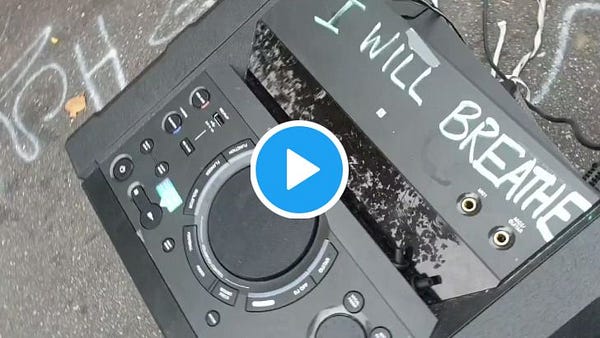
This was the third time in as many months that the city had threatened to evict Camp JTD and Camp Teddy—twin encampments in Philadelphia that have been protesting the city’s housing inequality since the start of the summer. Formed by a coalition of local activist groups OccupyPHA, Black and Brown Workers Cooperative, and Workers Revolutionary Collective, these camps are staffed by volunteers and activists, who give out free food and other mutual aid to a couple hundred homeless residents.
Unlike other encampments that are regularly swept by police, these occupied territories have tenaciously held their ground by positioning themselves as no-cop autonomous zones with a specific list of demands. At the top of that list: the city must transfer some of the vacant properties that it currently owns to a community land trust, so that these homes can be redistributed to the people as permanent low-income housing.


The last time I visited the Philly autonomous zone in mid-August, I met Jennifer Bennetch of OccupyPHA—a camp leader who had been previously houseless herself, and learned just how corrupt the city’s housing system is through first-hand experience. Jennifer explained to me how she watched the Philadelphia Housing Authority (PHA) intentionally blight her neighborhood, then seize houses and sell them to private developers to flip into luxury condos.
READ MORE: HOMELESS PEOPLE ARE THE UNDERDOGS OF THE BLACK LIVES MATTER MOVEMENT
Meanwhile, 6,000 people are homeless in Philadelphia on any given night, and nearly 50,000 people are on PHA’s waiting list for affordable housing, which has been closed since 2013. In one of the most radical punk moves I’ve heard of, activists have been busting into vacant homes owned by PHA, fixing them up, and handing them over to houseless mothers and children. According to Jennifer, the PHA owns so many vacant properties that the police have been mostly unable to track down which ones are being squatted!

I’d come back to Philly on a train from New York, intending to stake out the night before the eviction to document what would happen. Walking up to Camp JTD, which is in one of Philadelphia’s nicest neighborhoods, I passed news camera vans parked on every block. Across the encampment, the city’s largest Whole Foods had been boarded up preemptively, as if they were expecting a riot. A Whole Foods manager stood outside with her arms crossed, frowning at the store’s plywood, which someone had spray painted with a poetic declaration: “Houses stand empty, while homelessness grows. Who stands to profit? Somebody knows.” I couldn’t help cracking up when I noticed the store’s “We’re Open” sign had also been stolen, and now adorned the barricades of the autonomous zone, draped above a giant tree trunk.
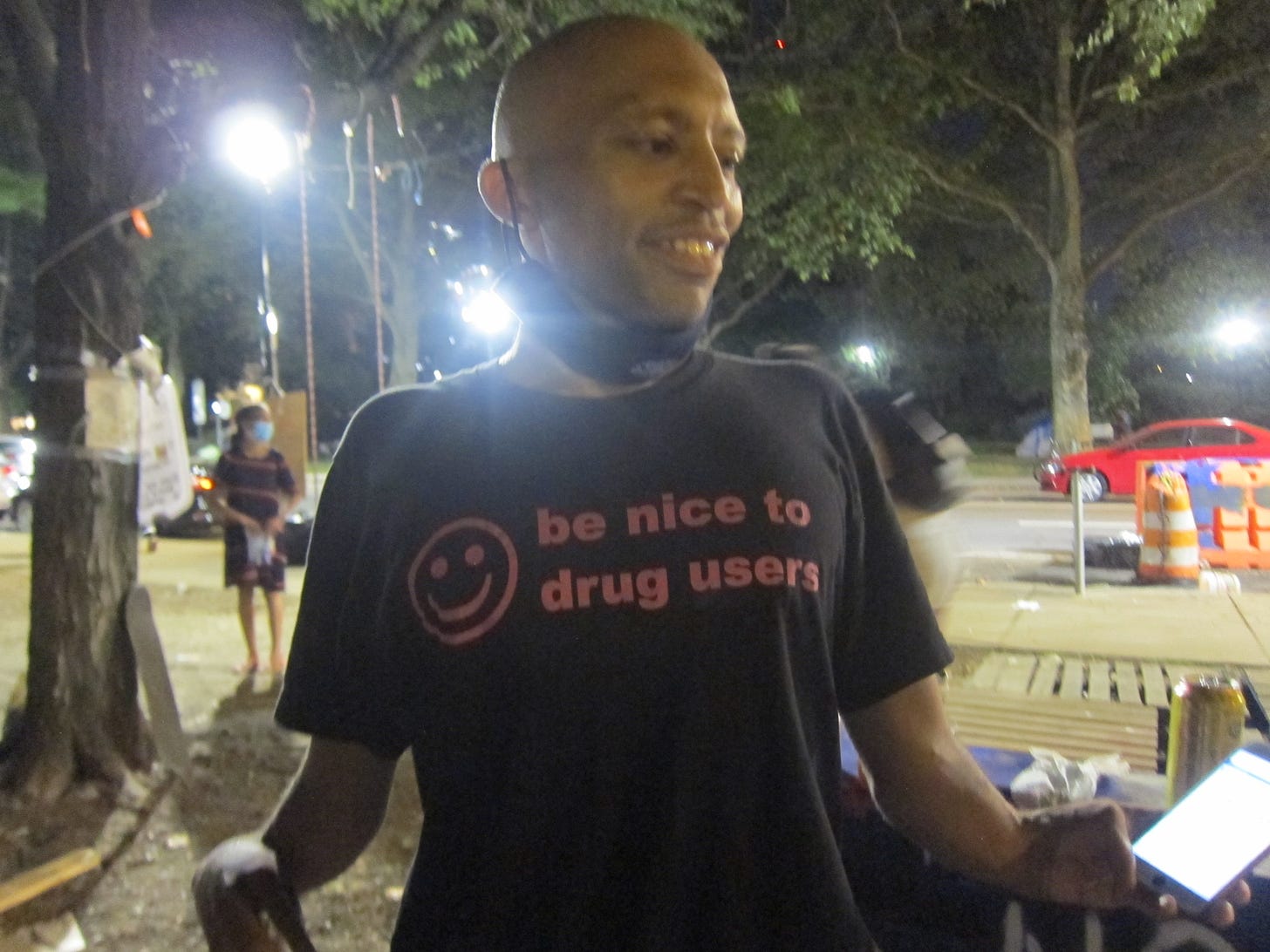
“We’re not trying to appease middle class sensibilities,” said organizer Sterling Johnson when I asked about his shirt. “Yeah, we are drug users. Be nice to us!”
Unsure of where I would sleep that night, I stashed my bags with a mom, dad, and their two teenage daughters from Brooklyn, who travel to protests and autonomous zones as part of the activist group Copwatch, monitoring the activities of police online and on the streets. Then I walked further into the zone, which was buzzing with carnivalesque energy: a speaker by the food station pumped out “Took Her to the O” by King Von, while dozens of young activists gathered by a street mural that said I WILL BREATHE for an impromptu block party, eating BBQ chicken and break dancing to Michael Jackson’s “Thriller,” as a projection screen played a basketball game.
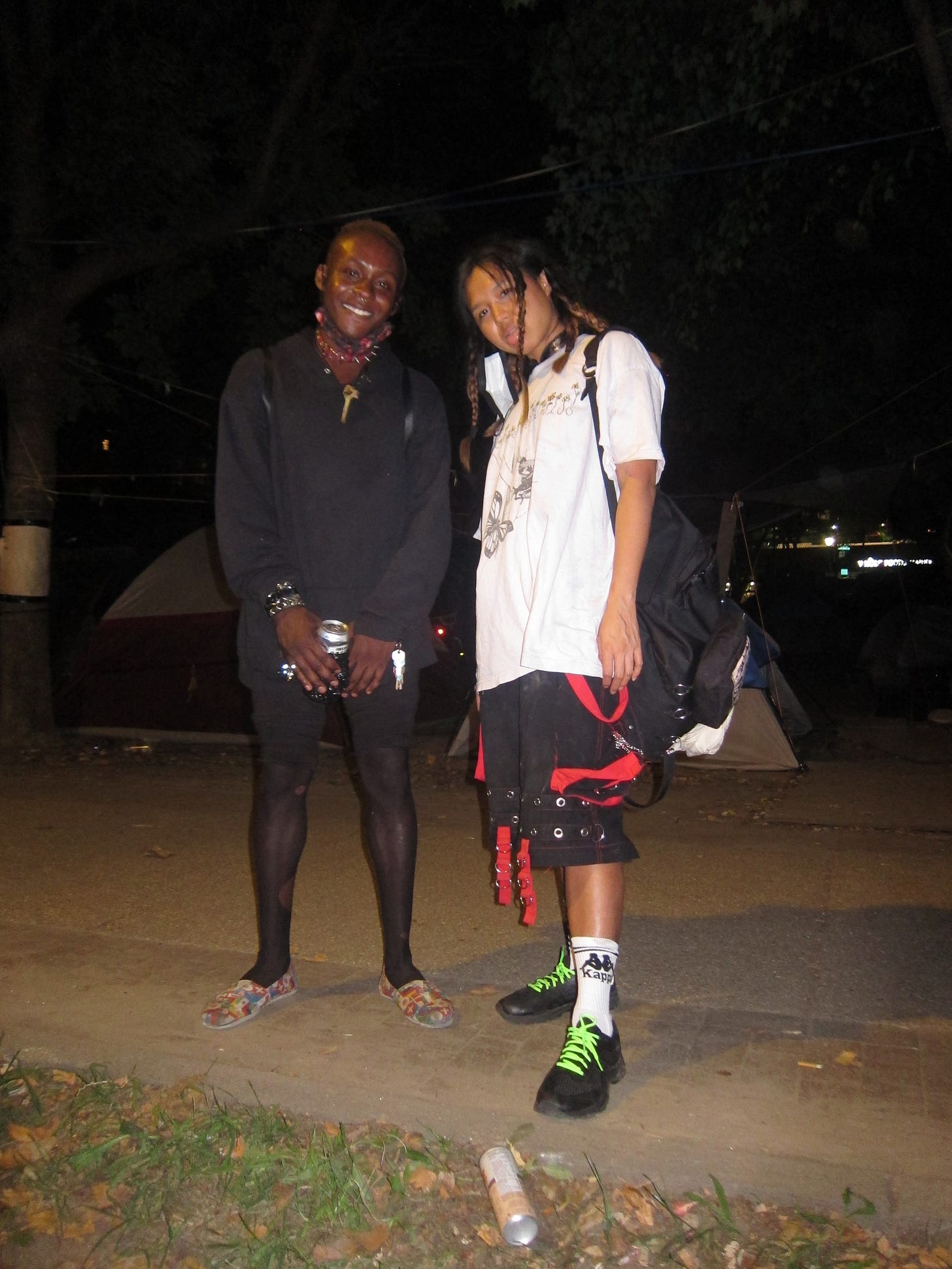
It was often difficult to distinguish between homeless residents and outside supporters; when I complimented a kid on his swaggy outfit, he told me he’d come to the camp that night after local gang members in his neighborhood threatened his life for being gay. After a few hours of asking around, I finally found a tent and pitched it on the nearby Rodin museum’s front lawn. Putting my earbuds in to plug out the music wafting from the zone, I passed out, waiting uneasily for dawn.
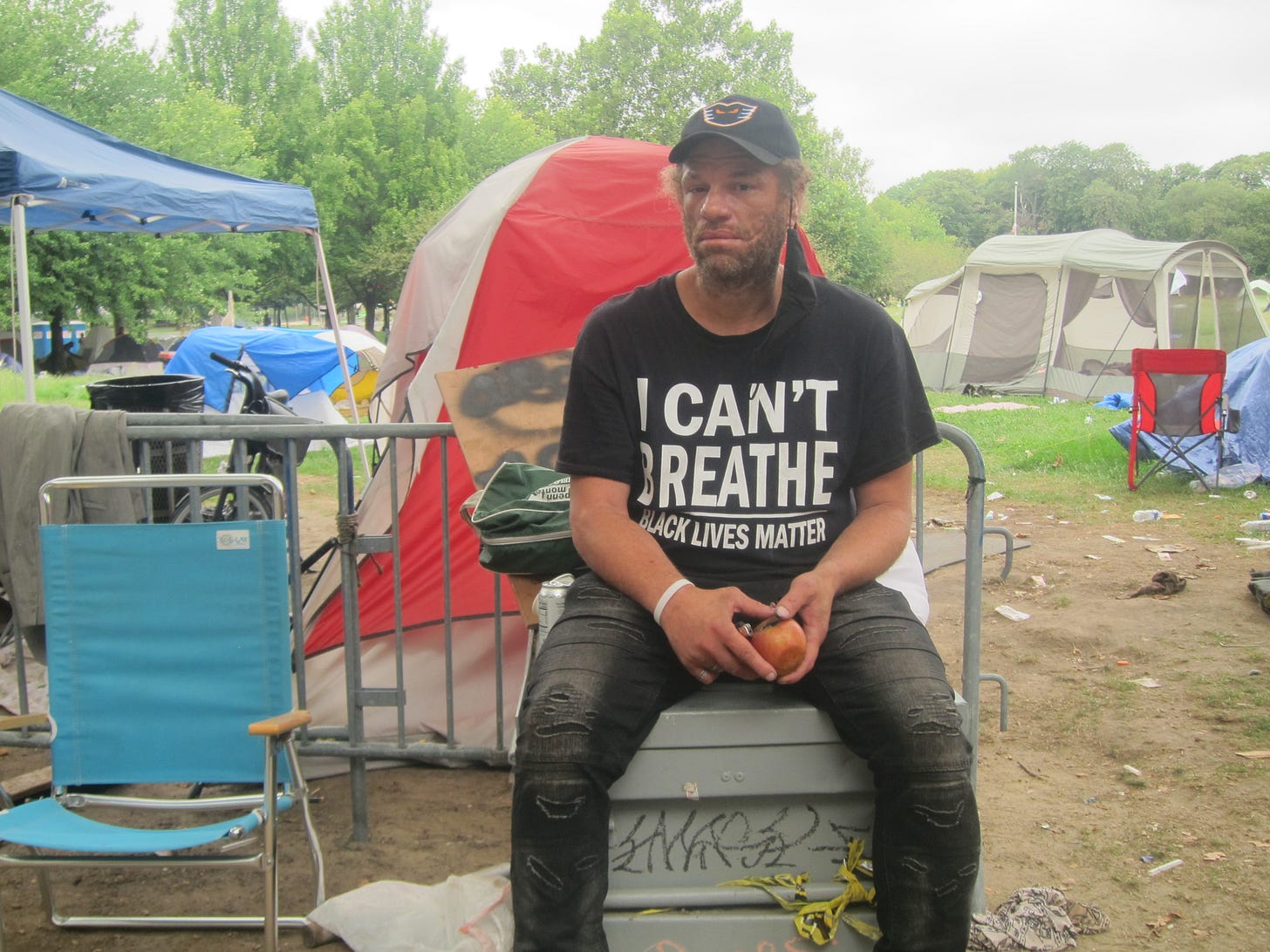
I woke up abruptly the next morning to the sound of police dispersal orders, and poking my head out, stared bleary-eyed at welfare workers walking by my tent with clipboards, offering services to the houseless residents in exchange for their dispersal.
Grabbing my camera, I ran towards the barricades, past a houseless man named George holding an apple carved into a bong. “I got shit on my mind, and it doesn’t smell good—especially so close to my nose,” he sighed, gazing at the growing crowd of protestors facing off with cops at the barricades. “It’s such a shame that so many people had to come sleep here and risk their freedom, for land that no one owns.”
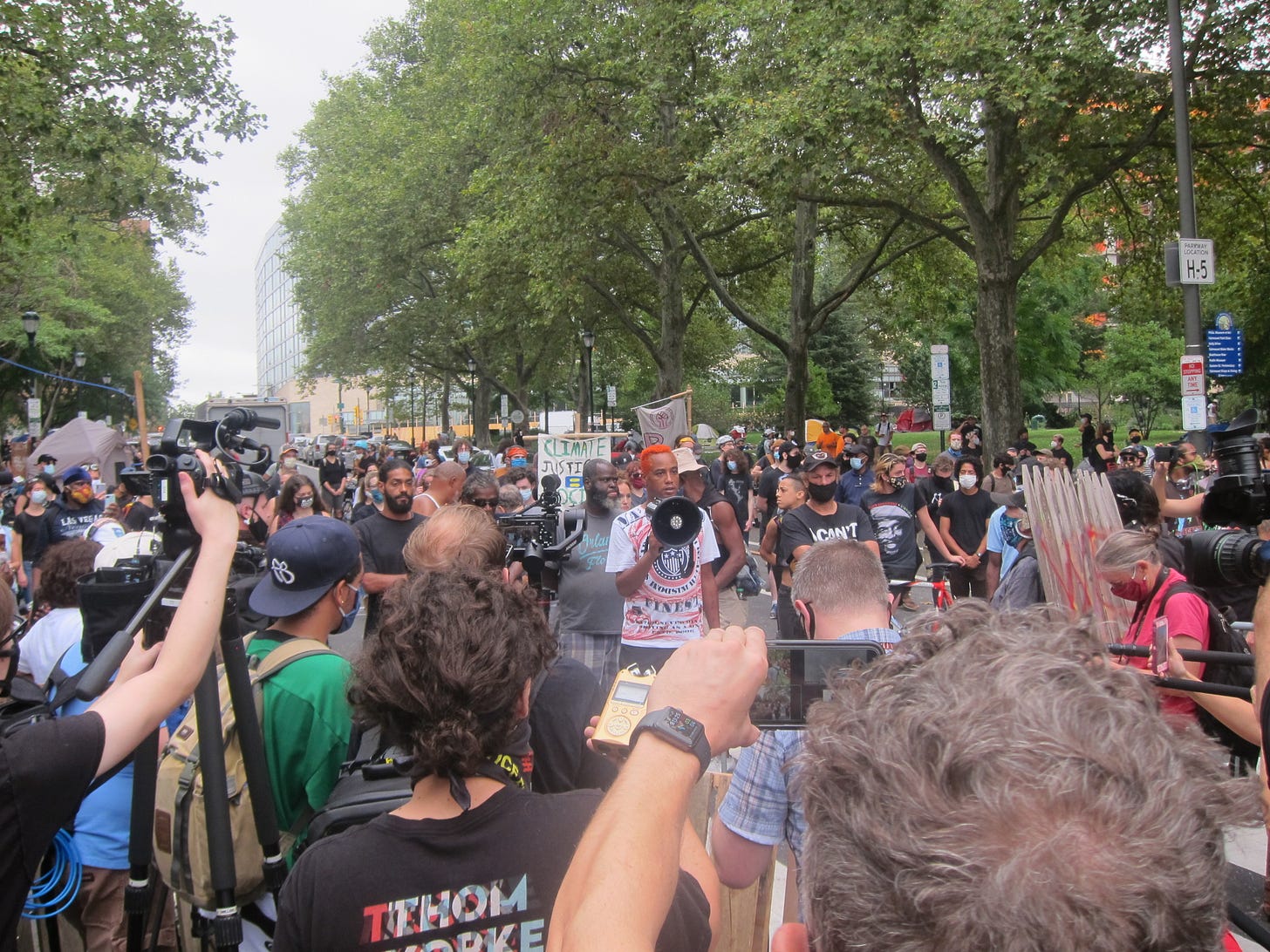
At the barricades, a giant scrum of reporters and news cameras crowded around one side while hundreds of protestors stood on the other—many holding up protest signs, while others in head-to-toe black outfits brandished homemade shields. Leaders took turns to deliver speeches into the cameras, with one fiery-haired speaker named Jamal shouting, “We’re not dumb enough to be tricked, and we are getting organized! We will not disappear and live in an alleyway, because the state deems us as not worthy.”
Tensions were high—at several points, protestors yelled at me to stop filming the crowd, with one woman threatening to snatch my phone out of my hand (we later made up when I helped her find her sunglasses).
On one side of the barricades, a young leader of the camp named Dominique was doing an interview with the popular media and livestream platform Unicorn Riot, explaining that the city’s offer to provide shelter beds or hotels to the homeless residents was not enough—especially since those services usually came with strict curfews and rules against things like drinking or having partners.


“No! We want freedom for all our fucking residents,” Dominique said, eyes flashing. “This is the only safe space for people until the city gives them real housing. If police evict us today, we are going to rebuild the next encampment, and make sure our residents have food, bedding, tents and whatever they need to make them keep going.”
The fight for the individual autonomy within this autonomous zone was a recurring theme. As I wandered further into the camp, I met a medic named Juan, who told me that many of the homeless residents won’t go into housing programs offered by the city, because they’re treated like wards of the state and not allowed to have partners.
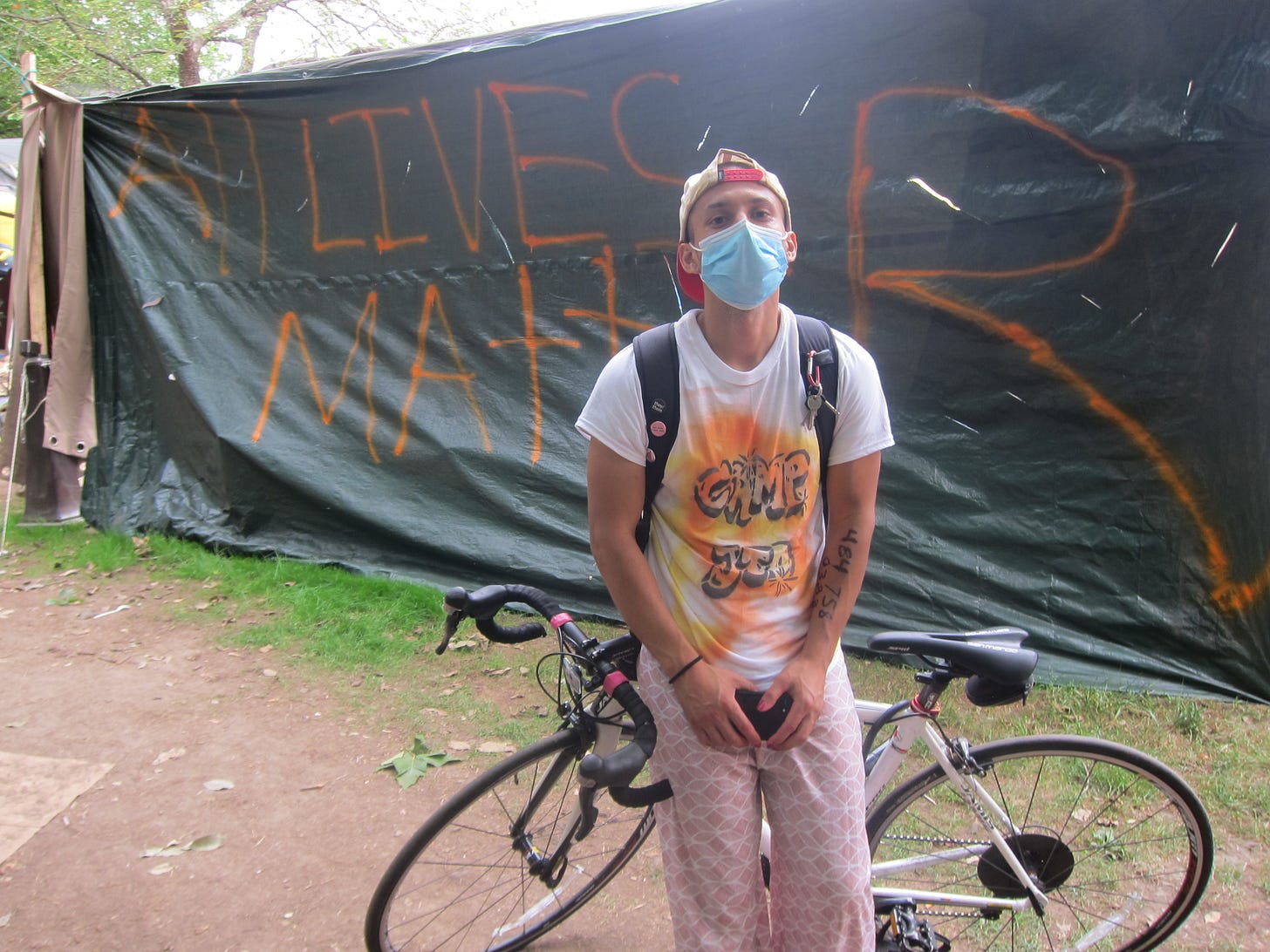
Juan, a queer volunteer medic
“Some people have PTSD, they just came out of prison, or are war veterans, and they can’t live alone,” Juan explained. Permanent housing, on the other hand, would help restore the sense of humanity that comes with autonomy. Juan said his time as a volunteer in the camp had fundamentally shifted the way he understood his profession—moving beyond the typical patient-provider dynamic, he now thinks of health as liberation work.
“You need the contextualization of someone’s whole humanity, and it’s more about being present in a non-judgmental way, not treating them like wards of the state,” he said. “This is a no-cop zone free from pressure of state violence, and we hold discussion groups where people have expressed their struggles with addiction, interpersonal violence, and being incarcerated. Those discussions feel to be one of the most important elements I’ve been able to witness.”


An elaborately decorated gazebo caught my eye—behind a wall of colorful curtains, I saw a stage fashioned out of wooden planks, with two signs saying “Black Lives Matter” flapping in the breeze as a speaker played songs from the radio. This was, without a doubt, the party tent. A man waved me inside, introducing himself as Adonis. He told me that the stage sometimes hosted music bands or poetry performances, then showed me a rack of T-shirts he’d spray painted that reminded me of festival merch (obviously, I copped). Adonis was cool as fuck, and I told him as much, admiring the jewelry that adorned his arms and neck. His partner, named Angela, poked her head out, rolling a blunt in one hand and giving me a shy smile. Then a Rihanna reggaeton remix came on the speakers and we glided around the stage, whirling around each other in slow, stoned loops.
I suddenly realized that I really needed to pee.
“Oh, we don’t use the Porta Potties, we made our own bathroom,” Adonis said. “Want me to show you?”
Opening the zipper to a tent, he gestured towards a trash bag-lined white pail and handed me toilet paper. “When you come out, just tie up that trash bag and hand it to me,” he said, zipping the tent back up. I peed into the bucket, and for a moment, hesitated over my bag of piss, fighting back an instinctive shame. Then I snapped out of it and tied the bag up, passing it to Adonis, who nonchalantly threw it into a covered trash can. He squirted hand sanitizer into my hands. “Rub that in real good,” he instructed.

Adonis and Angela
We sat back down in the lawn chairs, the creamy smell of a blunt swirling in the air, the heat sending us into a drowsy hypnosis. Adonis looked around the tent—the wall of scarves tied to the chain link fence, the macramé lamp hanging from the tent roof, the giant paper mache sculptures. “So the cops are coming in here to tear this all down soon?” Adonis sighed. “I’m going to tie up a bunch more scarves, so they have to rip them down one by one.”
Angela took a hit of the blunt and let out a long exhale. “Let them feel the sorrow,” she said, smoke trailing her lips.
Adonis leaned forward, nuzzling her forehead with his.
“But what if they get some enjoyment out of it, like the correctional officers stomping all over your shit in jail?” he said softly.
“How do you even evict a person on the street, from the street?”
This was part one of “How the Philly Autonomous Zone Won.” Part two, which arrives tomorrow, will be for paid subscribers only.
